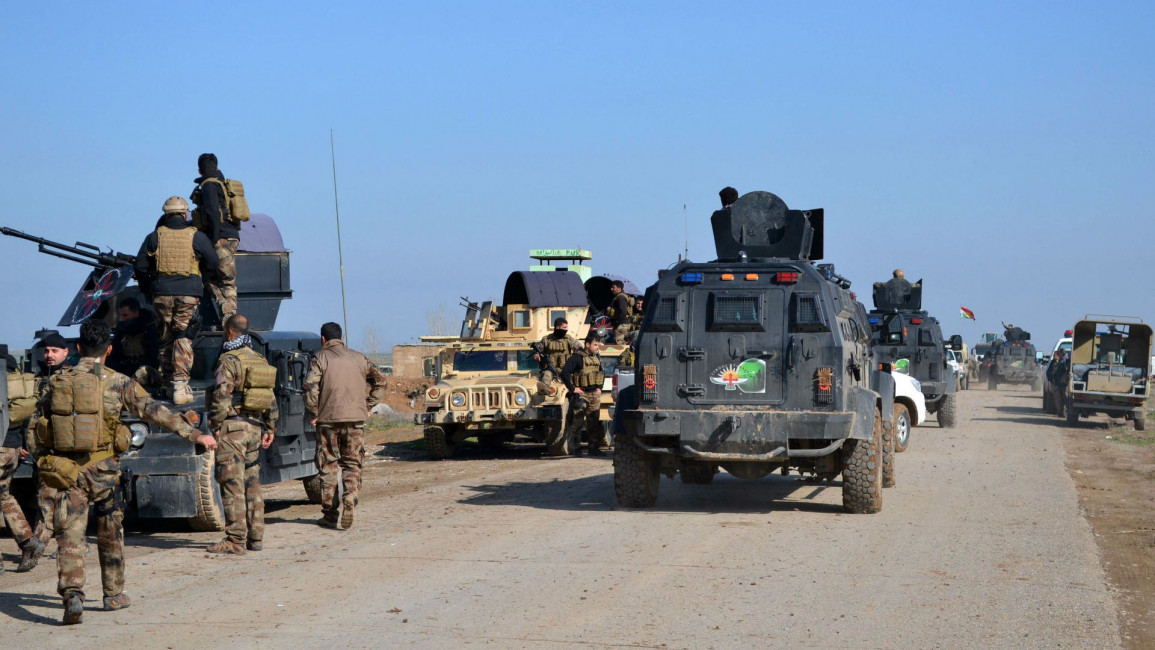Power-sharing agreement between Shia militias and Kurds in Kirkuk
A source on the governing body of the Iraqi city of Kirkuk has said that Kurdish forces and the Shia Popular Mobilisation fighters had agreed a power sharing deal in the oil-rich governorate, days after both sides traded threats over the important Iraqi city.
According to the source, who spoke on condition of anonymity, both sides have agreed to share power in the governorate. The Popular Mobilisation forces agreed to take cities like Hawija and Riyadh, as well as the Hamarin mountains, the Great Zab, al-Khanajir and Umm al-Obeid, while the Kurdish Peshmerga forces agreed to remain in the city of Kirkuk, the centre of the governorate.
Iraqi pro government militias committing 'harrowing abuses'. Read more. |
The source said the Kurds had agreed to allow Popular Mobilisation forces in these predominantly Sunni and Turkmen cities, following the expulsion of the Islamic State group (IS), in return for the forces not intervening in the city of Kirkuk, which is under the control of Kurdish Peshmerga forces.
Kurdish leaders have also pledged to protect Shias living in Peshmerga-controlled areas, the source added.
Representatives from both sides had signed the agreement in Baghdad, the source added, which will be effective once signed by Masoud Barzani, President of the Kurdistan Region.
Qais al-Khazali, leader of the Asaib Ahl al-Haq militia, had threatened to invade Kirkuk, because he considers it to be Iraqi, not Kurdish.
Controversy
Mohammad al-Jabouri, a senior figure in the Iraqi Powers Alliance, rejected the agreement, describing the step as a "malicious conspiracy" that targeted the peaceful coexistence of Arabs, Kurds and Turkmen in Kirkuk.
| The Peshmerga will control the city of Kirkuk itself, while the Popular Mobilisation forces will take control of other cities in the governorate. |
"The coalition government is trying to keep the militias' crises away from Baghdad, so it chose Kirkuk as a stage for political deals and agreements", Jabouri told al-Araby al-Jadeed, warning against extending power-sharing arrangements to other governorates if the Kirkuk deal was successful.
Niyazi Oglu, a Turkmen MP in the Iraqi Parliament, said that the new agreement between the Peshmerga and the Popular Mobilisation was made to cleanse Hawija from the IS control. He denied that the agreement was made against a certain component. MP Mohammad al-Obeidi from the Arab bloc considered the agreement unconstitutional.
"We are aware of the agreement, and all parties should know that their agreements are free publicity for the IS, and at the same time, they mark the beginning of sectarian and national conflicts within the governorate. They are not aware that Kirkuk is a time bomb that can destroy its neighbouring cities, which are religiously and ethnically mixed," Obeidi told al-Araby.
Ahmet Oglu Mansour, a senior figure in Kirkuk's Turkmen Front, told al-Araby: "Any agreement involving Kirkuk must have everyone's approval. We, the Turkmen of Iraq, will not approve it; we are not under the control of militias or Kurds, and Ankara should intervene to protect us from any agreements that threaten our existence in Iraq."
This is an edited translation from our Arabic edition.



